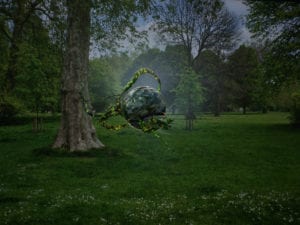Rufus Wainwright’s first opera Prima Donna moved to London in Spring 2010 to begin its international tour at Sadler’s Wells.
Rufus Wainwright (b. 1973) has been obsessed by opera since his adolescence. Having initially made his name with the eponymous pop debut, Rufus Wainwright in 1998, he hasn’t been a stranger to the limelight. He is a man well known for his propensity to plunge unmitigated into all areas of life, it comes as no surprise that his relationship with opera is one of passionate devotion. With typical irreverent charm he describes opera as “a disease that I developed as a teenager and that I just have to manage for the rest of my life.” Something he seems to have been doing with grace and success for some time now.
Wainwright’s musical achievements are prodigious: his pop songs range from complex orchestral arrangements to the simple beauty of piano and voice, expressed elegantly in songs such as The Art Teacher from Want Two (2004). He has written for film and for dance productions and has worked with the Berliner Ensemble to put Shakespeare’s sonnets to music. Given his love of the genre and his musical intent, it was only a matter of time before opera joined his oeuvre. The influences of the form are obvious throughout his work: the song Barcelona features lyrics from the libretto of Giuseppe Verdi’s Macbeth and Damned Ladies from his first album is a desperate appeal to the tragic leading ladies of famous operas.
The latter song is an early demonstration of Rufus Wainwright’s fascination with that most notorious of opera figures, the diva, and it seems natural then that his first opera should focus on the role. Wainwright’s debut opera, Prima Donna premiered at Manchester International Festival last year and tells the story of Régine Saint Laurent, once the world’s most acclaimed operatic soprano, who is returning to the stage after six years of silence. The opera makes its reprise with a new production at Sadler’s Wells this April before embarking on an international tour.
The production that tours this April, has undergone subtle, but significant changes from its Manchester debut: “The one that we built up in Manchester was a bit of a behemoth, 10 set changes in one act where there were supposed to be none.” With a new artistic team on board including Tim Albery as director (whose impressive repertoire includes operas for English National Opera, Metropolitan Opera and Scottish Opera among many others) and acclaimed conductor Robert Houssart, the new production is simpler and more direct. The set has been pared down and the focus is more intense and “more reliant on the music.”
Wainwright found this dedication to the music to be a liberating aspect of creating an opera: “Writing and composing one was a pure joy because it gave me an opportunity to focus totally on music and nothing about photo-shoots or fashion; I could just grow a beard, get fat and write opera.” Unlike pop music, where the personality of the artist is often as important as the music they produce and sometimes more so, opera “is something that requires all of your attention and all of your dedication and really obliterates your ego. It’s just an awesome force, and I don’t mean cool, I mean huge and frightening.” He is clearly humbled by the experience and the demanding quality of opera is what makes Rufus Wainwright’s move into opera composition so daring.
The word “opera” stems from the plural of the Latin opus, meaning work, and Wainwright describes the process as one that required “blood, sweat and tears.” Although he has a vast knowledge of the opera world, it was an undeniably ambitious step for Rufus Wainwright to create an entire opera. He speaks of the learning curve involved in moving between aficionado and composer: “I had developed a few idealistic visions that were just shattered to pieces when I actually entered into the reality of the situation.” One of the biggest challenges was the process of collaboration. An opera has to “be made with many hands” and collaboration can be a double-edged sword: on the one hand it enables burdens to be shared and creativity to be nurtured, but it also requires careful diplomacy and forces compromise. This cannot have been easy with a subject so close to his heart and Wainwright admits that there were moments when he “thought of walking away whole-heartedly and never returning to the opera house.”
Despite the moments of apprehension, it seems that Wainwright’s passion for opera and his skill as a musician were enough to transcend the gaps in his experience. He is deeply gracious about his singers, describing them as “some of the most amazing and capable musicians on earth” and the respect is clearly mutual. Janis Kelly, the celebrated Scottish soprano who takes the role of Saint Laurent, speaks of his “great sense of drama” and his “extraordinary gift of lyric writing.” Although there was great support amongst the creative team, developing Prima Donna was a challenging and broadening experience for everyone involved. Wainwright wryly remarks: “I have stretch marks from how much I grew emotionally in this process” and Janis Kelly is sincere when she says: “It’s demanding; it’s not an easy night. Dramatically it’s very stretching and vocally it’s stretching too and it’s not just solo items, but he’s also written beautiful duets and quartets.” Wainwright is keen to see the opera world evolve and he is vocal about challenging the static way of working that the opera world has slipped into: “Everybody kind of falls into this military order when things get rolling, which is necessary on one hand to keep things going, but I do think it also stifles creativity and is something that has to be toyed with a little bit in my opinion.”
Such a structured way of working can act to impede the music and Wainwright admits that “sometimes classical music has become so kind of mathematical and intellectual and cold in many ways.” His preference is for passion and vigour and it is this vitality that he has attempted to capture with Prima Donna. He muses: “I think what makes it different is its utter reliance on emotional impact” and Kelly expresses her agreement, remarking upon Rufus’ ability to “get to the real core of the person. The melodramatic action of the grand epic opera moment is all there, but it’s stripped away at the end and you see the person behind it.”
The emotion of this opera is perhaps not entirely disconnected from the fact that it is performed in French, the language of passion. Wainwright explains that he began the opera in French to get the right aesthetic and that he had intended to switch the language, but as it progressed “more and more of the melody started to come out of the language.” Although French may have caused initial difficulties in getting the opera produced (the Metropolitan Opera originally commissioned the piece but wanted it in English), Wainwright doesn’t consider lack of understanding to be a problem: “You go to all major opera houses now and they have translations, but I’ve always loved not understanding opera.” Even the words and their meanings take a back seat to the overwhelming power of the music in opera and Wainwright is more than happy to be engulfed by it. He suggests that “opera chooses you; you don’t choose it.” A fate he has accepted gladly and Prima Donna is his glorious homage to these shackles of opera, which he wears with reverence.
Wainwright’s opera deals with the question of timing, when should a performer take that graceful step back from the stage? However, it must be said that the man himself shows no signs of letting up with his own career. He says that whilst he would love to continue with opera, he also feels that he has “a little more work to accomplish in the pop realm” and he’s already heading straight back into the fray, with a new album due for release on the 5 April. All Days are Nights: Songs for Lulu is not a complete departure from opera, although it never is with Wainwright, and Les Feux D’Artifice T’Appellant, the final aria from Prima Donna is included as a highlight on the album.
Rufus Wainwright’s Prima Donna began its international tour at Sadler’s Wells on Monday 12 April 2010. The production then moved to Toronto for the North American premiere, which will took place at Luminato, Toronto Festival of Arts and Creativity (11 – 20 June 2010). www.sadlerswells.com.
Bryony Byrne




